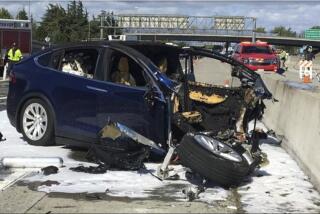Seeing Promise, Not Gloom, in Technology
- Share via
Once again, it’s a time of technological ferment in the computer industry. Apple co-founder Steven Jobs--now running his new company, Next Inc.--last week introduced a computer that can play Beethoven and recite Shakespeare. New computers called workstations are bringing computing power to the desktop that less than 20 years ago was confined to huge machines in air-conditioned rooms.
These new computers, powered by advanced microprocessors, are capable not only of running payrolls and storing company data, but of communicating in plain language and helping with decision-making.
Yet the stock market sees more gloom than promise in computer companies. Many are selling at or near their 52-week lows, and bad news drives out good. In a year when computer sales are up 23%, the market pays attention to predictions that next year will be down. Some investors worry about a rerun of the computer slump of 1985-86 when technology got ahead of customers’ ability to use it.
They have reason to worry. Already customers are questioning how much use they’re getting out of new machines that cost $5,000 to $10,000 each. One problem, says analyst James Weil of Gartner Securities, is that “not enough software has yet been written for the new computers.” So for many companies, a new workstation is like a rocket ship without a mission.
In the long term that’s no bad thing: Columbus had ships and an ocean without a clear destination.
But in the short run it could result in a brutal shakeout among the 250 personal computer companies, as well as the 5,000 companies making peripheral equipment and the 20,000 companies making software--not to mention 20,000 retail computer stores.
Healthy Growth
So computers advance, but companies fail. What’s a person to think? That depends on whether you’re thinking about U.S. industry’s position in the world--a big consideration these days as the trade figures bounce up and down.
Or whether you’re thinking as an investor who would like to put money in the promise of computers.
Or if you’re thinking as someone who works at a computer terminal in office or factory. What do powerful workstations or Steve Jobs’ singing computer mean to you?
World position first. What seems like chaos is healthy growth. Failures have outnumbered successes in electronics, yet this clumsy process has allowed the U.S. computer industry to lead the world from the invention of the transistor through the personal computer. It is always unpredictable; in 1978, optimistic projections for personal computers saw a $2-billion industry. Today, it is $30 billion.
The important thing is that technology continues to originate in the United States, because that creates new businesses--as for example the Apple Macintosh spawned a boom in desktop publishing.
Change, however, can be a trial to investors who begin to doubt that uses will be found tomorrow for computer capabilities developed today. The big money sometimes takes a longer view.
Steve Jobs’ Next, for example, won’t deliver products until spring 1989 and is years away from profitability. But it has the backing of a $10-million contract from IBM and a $20-million investment from H. Ross Perot, the one-time IBM salesman who built his own company, sold it, and made billions.
Otherwise, intelligent investors are selective. They recognize that makers of the microprocessors that power the new computers--Intel and Motorola--have long-term promise. Analysts of the personal computer industry, such as Bruce Lupatkin of San Francisco’s Hambrecht & Quist, think that Compaq Computer will survive a shakeout, and so will Tandy Corp., which has a tie-in with Digital Equipment.
As for computer users, symphonic microprocessors may not affect you directly, but the advances they represent will. They mean you’ll be able someday to work your terminal by voice command and handle tasks more easily. It’s like the Indianapolis 500, which tests auto innovations that later show up in the family car.
So what’s a person to think as companies rise and fall? Think like Steve Jobs and Ross Perot, who made millions by seeing the promise, not the gloom.
More to Read
Inside the business of entertainment
The Wide Shot brings you news, analysis and insights on everything from streaming wars to production — and what it all means for the future.
You may occasionally receive promotional content from the Los Angeles Times.










